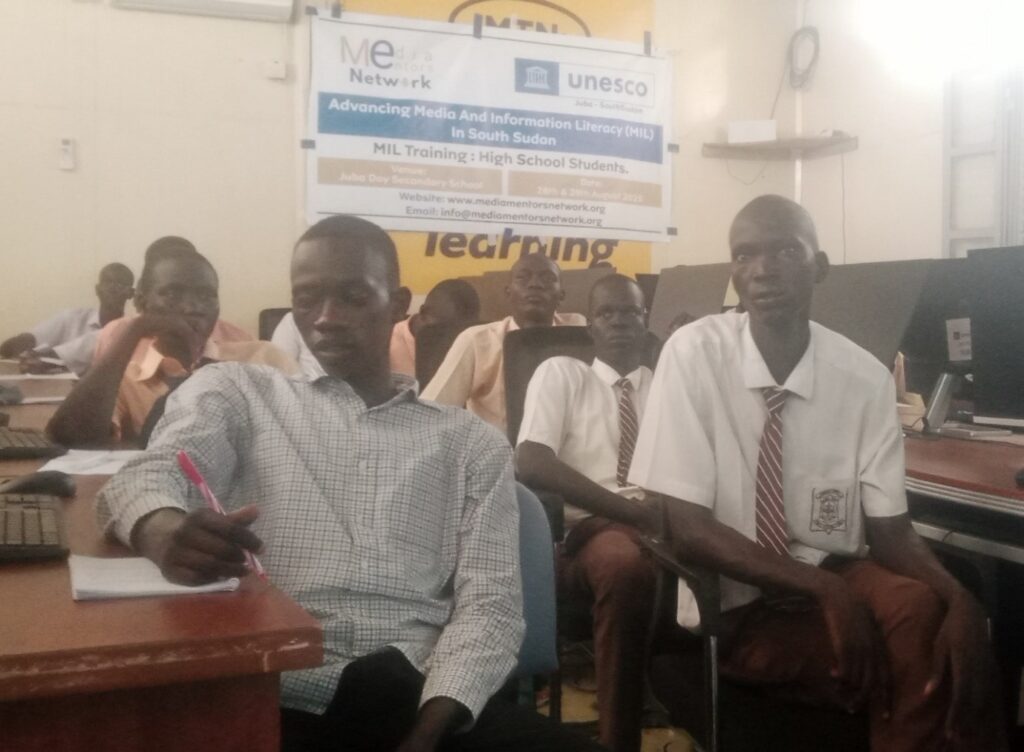South Sudan's English Daily Newspaper
"We Dare where others fear"

By Simon Deng
The Media Mentors Network, with support from the United Nations Educational, Scientific and Cultural Organization (UNESCO), has launched a training programme in media information literacy for aspiring journalists from four public secondary schools.
Dhieu Williams, the Project Coordinator for the Media Mentors Network, said that they are empowering aspiring journalists and media professionals to cultivate a vibrant media landscape in the country.
Williams explained that the Media Mentors Network, formed by a group of journalists, mentors aspiring journalists, and noted that participants come from schools including Supiri, Juba Technical, and Juba Commercial.
“We are implementing the media information literacy curriculum and testing it with four schools. We have selected 30 students, and once we complete this phase, we will expand it nationwide,” said Williams.
“We are teaching them how to craft messages, how to identify misinformation and disinformation, and how to ensure that information is ethically shared online while verifying what is false and what is accurate,” he added.
Williams highlighted that the world is inundated with information, emphasising the necessity for people to discern the type of information they consume, including the verification of what is correct and what is false.
“People should have access to information, particularly accurate information. As a country preparing for elections, it is crucial for citizens to discern between correct and false information. When everyone is informed, they can make well-informed decisions,” he stated.
Alex David Juma, a 16-year-old second-year student from Juba Technical Secondary School, expressed that the media information literacy training aligns with his career aspiration of becoming a journalist in the country.
“I am pleased to participate in the media information literacy training. My dream is to assist my country as a journalist. In journalism, you can both receive and disseminate information; I want to serve my country by exchanging information,” said Juma.
“I have learned about communication and the importance of media information literacy, including receiving information and compiling it into a story. If there is misinformation or disinformation, we can correct it,” he added.
Amjima Alfred Michael, an 18-year-old third-year science student at Juba Day Secondary School, noted that the training in media information literacy has equipped them with journalism skills, including the verification of circulating information.
“As a student at Juba Day Secondary School, I have learned how to utilise information. Sometimes, you encounter misleading information on Facebook, WhatsApp, and other sources. We have learned to analyse and evaluate information before sharing it with the public,” said Michael.
Emma Joseph Henry, an 18-year-old third-year science student at Juba Day Secondary School, remarked that they have acquired knowledge that will aid them in disseminating accurate information.
“We have learned a lot about media information literacy. As young students, we encounter much misinformation. When information is posted, it can negatively affect society, but we are now trained to share information that positively impacts our community,” said Henry.
Melish Abas, the director at the Direct Action Training Institute, said that they are collaborating with the Media Mentors Network to run the laboratory facilitated by UNESCO.
“We are partnering with the Media Mentors Network to implement capacity-building programmes in Information and Computer Technology (ICT) outreach, basic computer skills, data management, and cybersecurity,” said Abas.
“We are also bridging digital literacy gaps by incorporating media information literacy for high school students, journalists, and young girls in various communities. Our goal is to enrich people with advanced technology,” he concluded.




